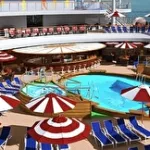Heavy weather at sea is no joke. It ruins the pool-side ambience and threatens to upset the contents of our cocktails (not to mention the stomachs of those less conditioned to nautical travels).
It often cancels port-calls – notably on our most recent Caribbean jaunt, when it was just too damn lively to tender ashore at Grand Cayman – and it can also lead to long, tedious conversations about millibars, north-westerlies and sou-westers.
The Met Office’s daily Shipping Forecast may be a thing of beauty to meteorologists, but it bores the life out of us, and often ruins our Radio Four listening.
We’d rather gnaw an arm off than try to figure out what it means when the wind is “backing,” why they changed the name of Finisterre to FitzRoy, and how soon we can expect to be blown off our feet when a gale is “imminent.” In our part of the world, it is often bloody windy, but that usually has to do with the Brussels sprouts.
No, bad weather of the maritime variety is a pain in the stern, and no mistake. It may be fun to watch the water sloshing out of the swimming pool, but sooner or later it lands in some poor blighter’s lap, and then there are complaints all round. “Fancy letting the water get out of the pool,” etc.
Mind you, there are worse things that can land in your lap. One famous incident from around December 1999 concerns recollections of the maiden voyage of the newly-renamed Caronia of Cunard. Formerly the classic Vistafjord, she was later given a last hurrah by Saga Cruises as their Saga Ruby, but it was in her middle guise as the elegant Cunarder that she hit trouble.
It could have been predicted, of course. After all, who names (or re-names) a ship in the depths of winter. In Liverpool. With a first voyage south through the Irish Sea?
Yes, of course it sounded like a good idea to the new bosses of tradition-minded Cunard. Going back to Liverpool, from where so many Cunarders set sail for all points west, was a wonderful nod to the line’s ocean-going heritage. But it was December. In Liverpool.
Things didn’t go smoothly from the start. The re-naming ceremony was conducted by the less-than-erudite John Prescott, who proceeded to call the new President and Chief Operations Officer of the company Larry ‘Pimpernel’ instead of Pimentel, and things went downhill from there.
The grand fireworks show was marred by the first heavy rain of the evening, and there was a distinct list to the ship as it set sail, due, as it later turned out, to European Union regulations on ballast, which prevented full stabilisation of the tanks both port and starboard. It would have been fine in clement conditions. But this was winter. In the Irish Sea.
As it was a major media occasion, Cunard was holding its annual Christmas Lunch aboard ship in the recherché little alternative dining room, the Tivoli Restaurant. Which was right aft. On a ship with a list. In the North Sea. In winter.
I’m sure you can already anticipate the serving faux pas that was to come. Breakfast had already been an occasion for stern stomachs and small appetites, but lunch promised to be something different altogether, a trial by five courses, starting with a beautiful squash soup served from elegant tureens.
Now, remember; we are right aft, on an upper deck, which is the last place you want to be when a ship is misbehaving. The wind was most definitely “backing” and we were well past “imminent” for the gale-force variety. It was right here, right now, and the Tivoli Restaurant was akin to dining on the back of a bucking bronco.
And here comes the soup tureen, to serve the most elegant of female diners in her best evening frock. And there goes the soup, with a resounding splosh, straight into her lap. Every last drop. It wasn’t the waiter’s fault of course. He’d have had better chance of hitting a 100-yard target with an arrow from the back of the aforementioned bronco than trying to ladle liquefied squash into a diner’s bowl that lunchtime in the Tivoli.
To her enormous credit – and to a silent but admiring audience – the said lady merely dusted herself down (very messily, it had to be admitted), and retired from the dining room, to return some 10 minutes later in an alternative cocktail dress, ready for the salad course. She fully deserved the spontaneous round of applause that rang around the restaurant, even if the waiter didn’t have the heart to join in.
Her heroism was upstaged only by a second woman during dinner service, who took the cold remains of a poorly-advised plate of sauerkraut and pork straight down her cleavage. She sat quietly, eyes closed, as she considered her options and, while she too left the dining room in graceful retreat, we saw neither hide nor hair of her for the remainder of the voyage. Quiet whispers of “litigation” and “ample recompense” worked their way through the wait staff.
And that’s why bad weather can, actually, be quite fun. You never know who will be the victim of stray soup ladles and, even if it’s you, you can still enjoy the joke by changing as politely as you can, and soaking up the applause afterwards.
So, the next time you’re tempted to moan about missing a port because of tender troubles, or get a dose of the miseries if it rains on your cruise-going parade, just remember the lesson of the Caronia, and that a lapful of hot soup or cold cabbage between the tatas would be infinitely worse.
Or, as Groucho Marx once famously said: “I’ve had a perfectly wonderful evening, but this wasn’t it.”





